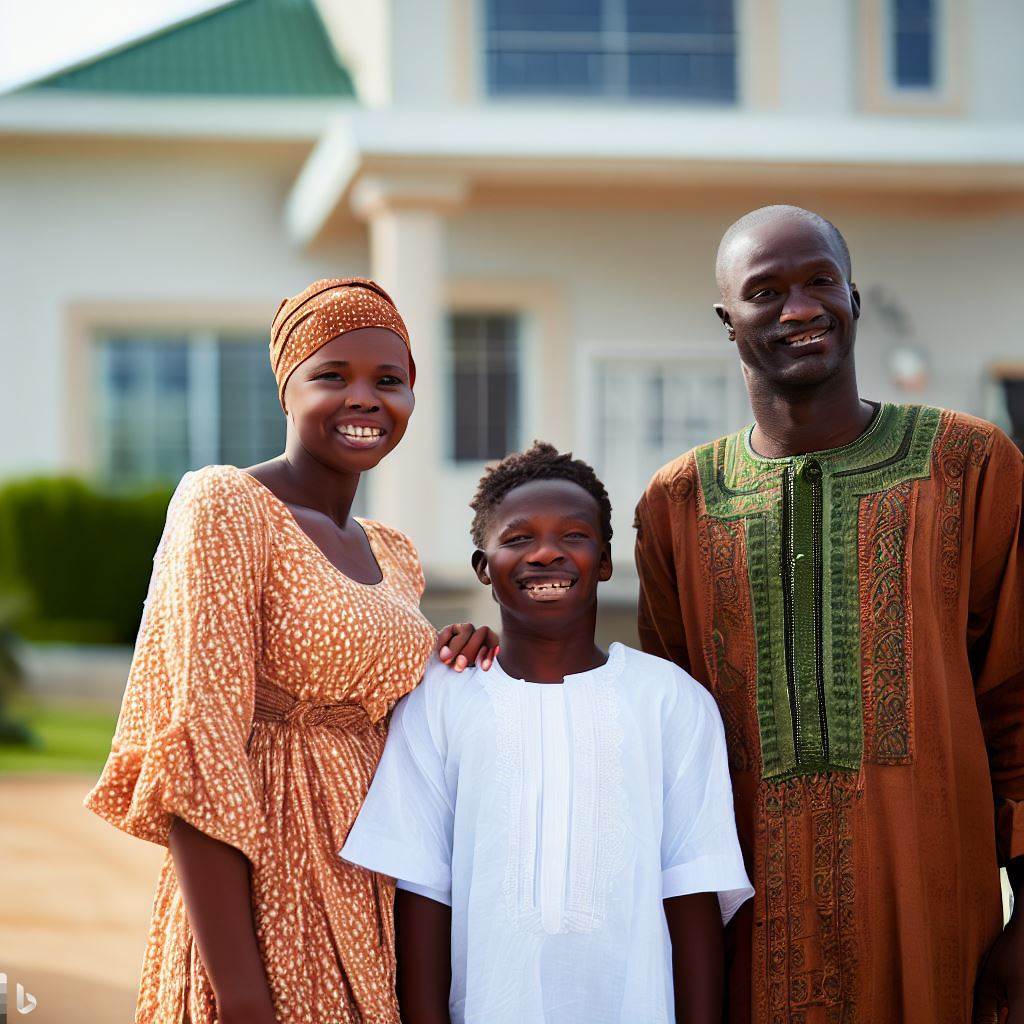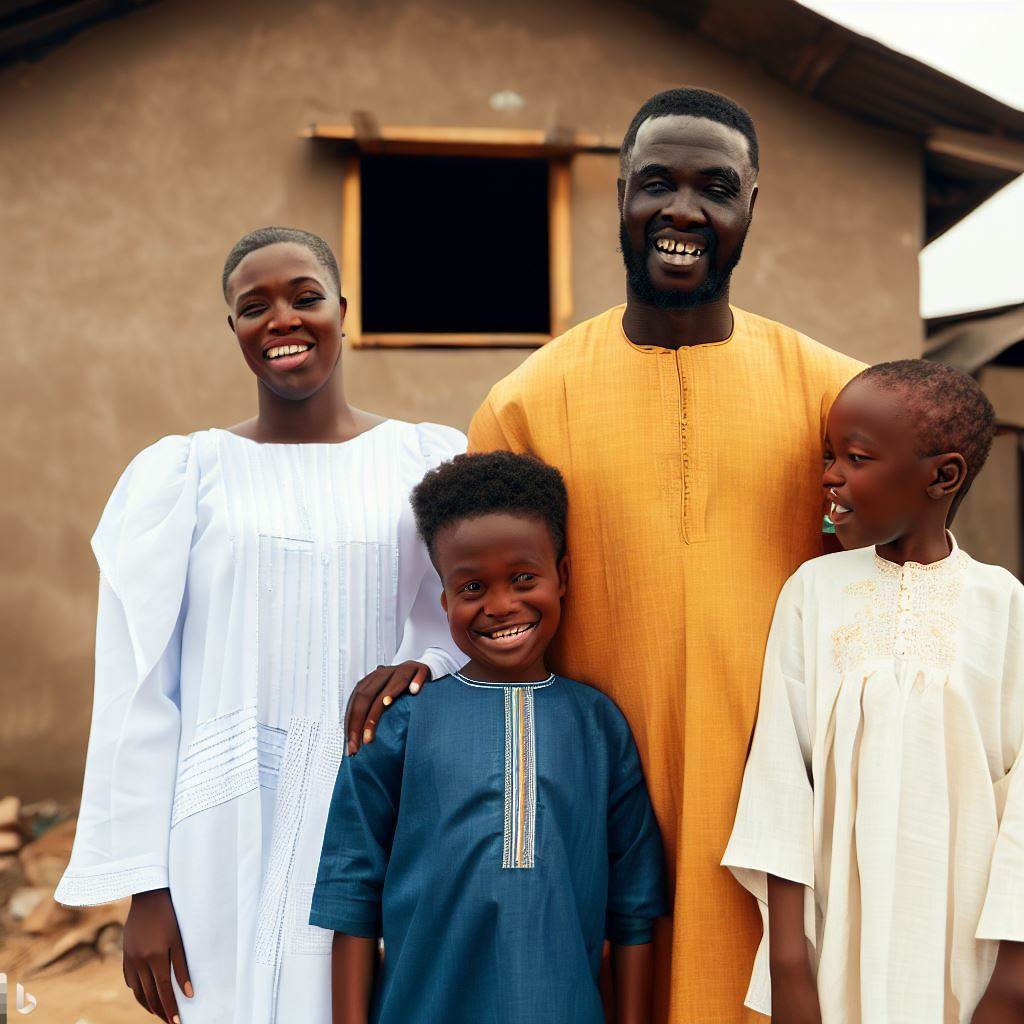Introduction
Let’s explore the types of homes in Nigeria.
In Nigeria, there are various types of homes that cater to different preferences and lifestyle. Understanding these options is crucial for individuals interested in real estate or planning to relocate to Nigeria.
This guide aims to provide insight into the diverse housing options available in Nigeria.
By exploring the different types of homes, readers will gain a better understanding of the Nigerian housing market and make informed decisions.
From traditional mud houses to modern luxury apartments, Nigeria offers a range of housing options to suit varying budgets and lifestyles.
Each type of home has its unique charm and characteristics, representing the rich cultural diversity of the country.
For those interested in real estate, this guide will serve as a valuable resource. It will showcase the different architectural styles, materials used, and the advantages and disadvantages of each type of home.
Additionally, it will include information on the specific areas or regions in Nigeria where these homes are commonly found.
For individuals planning to relocate to Nigeria, understanding the different types of homes will aid in finding suitable accommodation that aligns with their preferences, needs, and budget.
This guide will empower readers to confidently navigate the Nigerian housing market and make an informed decision about their future home.
Whether one is interested in a traditional Nigerian bungalow or a modern high-rise apartment, this guide will provide comprehensive information to make the process easier and more enjoyable.
Stay tuned for the upcoming sections where we will explore each type of home in detail!
Traditional Nigerian Homes
Nigeria’s rich cultural heritage showcases various traditional homes reflecting diverse ethnic groups and architectural styles.
Builders construct these homes using local materials and techniques, holding historical and cultural value.
Mud houses, common traditional Nigerian homes, exhibit ingenious construction with clay and straw, offering natural insulation against extreme heat and promoting air circulation for comfort.
Your Personalized Financial Plan
Get expert financial advice tailored exclusively to your goals. Receive a custom roadmap in just 1-3 business days.
Get StartedThatched roof houses, known as “rondavels,” are also popular, featuring conical roofs made from locally harvested grass or palm fronds.
These roofs provide excellent protection from heavy rainfall and natural warmth during colder months.
Adobe dwellings, made from sun-dried mud bricks, are prevalent with their durable rectangular shape and effective temperature regulation.
Utilizing clay, straw, grass, and mud showcases sustainable and environmentally friendly practices, harmonizing with the surroundings.
The design and structure of these homes hold cultural significance; for example, Igbo mud houses symbolize unity and communal living, while rectangular adobe dwellings in the Hausa culture represent a more private and individualistic lifestyle.
Passed down through generations, traditional Nigerian homes preserve cultural identity, signifying resilience and adaptability over time.
They are cherished and celebrated today, with efforts made to preserve and restore them for their architectural and cultural value.
These homes serve as a link between the past and the present, fostering a sense of belonging and roots.
In essence, traditional Nigerian homes, including mud houses, thatched roof houses, and adobe dwellings, are integral to the country’s architectural heritage, reflecting ingenuity and adaptability while representing diverse ethnic groups and traditions.
Preserving and appreciating them is vital to maintain Nigeria’s rich cultural identity for future generations.
Read: From Tenant to Homeowner: A Nigerian’s Journey
Modern Nigerian Homes
When it comes to modern types of homes in Nigeria, there are several prevalent options that cater to different lifestyles and preferences. Let’s explore some of these homes and the unique features they offer.
Bungalows
Bungalows are single-storey homes that are popular among Nigerians due to their affordability and simplicity in design.
They typically consist of a living area, bedrooms, kitchen, and bathrooms. Bungalows are ideal for individuals or small families who prefer a cozy and compact living space.
Unlock a Debt-Free Future with Our Unique Strategies
Imagine a life unburdened by debt—a reality we help you visualize and achieve. We offer personalized strategies tailored to your unique situation, guiding you step-by-step toward financial freedom.
Start TodayConstruction techniques for bungalows often involve reinforced concrete blocks for the walls and a combination of concrete and steel for the roof structure.
These materials ensure durability and stability. Bungalows also commonly feature large windows to allow ample natural light and ventilation.
Duplexes
Duplexes are multi-level homes with separate entrances for each level. They are perfect for larger families or those who prefer more space.
The ground floor usually consists of the living room, dining area, kitchen, and sometimes a guest room, while the upper floor contains the bedrooms.
Unlike bungalows, duplexes typically utilize stronger construction materials such as reinforced concrete beams and columns.
This ensures the stability of the structure and allows for the additional weight on the upper level. Duplexes boast a variety of architectural features like balconies, verandas, and intricate façades.
Apartments
Apartment living has become increasingly popular in urban areas, particularly among young professionals and students.
Apartments are part of larger buildings and often include several units on each floor. They are known for their convenience and proximity to amenities and employment hubs.
Construction techniques for apartments involve a combination of materials such as concrete blocks, steel, and glass.
These structures are designed to maximize space utilization while maintaining structural integrity. Apartments commonly offer amenities like swimming pools, gyms, and parking spaces.
Comparing Construction Techniques and Materials
The construction techniques and materials used in modern Nigerian homes vary based on the type of dwelling.
Bungalows primarily use reinforced concrete blocks, while duplexes require stronger beams and columns. Apartments, on the other hand, use a combination of materials to ensure structural stability.
Each type of home also has unique considerations when it comes to construction. Bungalows emphasize simplicity and cost-effectiveness.
Duplexes focus on durability and accommodating multiple levels. Apartments prioritize maximizing space and amenities in a multi-unit building.
Unlock Untapped Nigerian Wealth with Our Expert Advice
Imagine accessing investment opportunities others overlook—stocks, bonds, real estate, small businesses tailored to you. We offer personalized advice you won't find elsewhere, guiding you to financial success.
Unlock WealthArchitectural Styles and Features
Modern Nigerian homes showcase a range of architectural styles and features. Bungalows often feature a minimalist design with clean lines and open floor plans.
Duplexes showcase more ornate facades and decorative elements, reflecting personal taste and artistic expression.
Apartment buildings adopt a more contemporary and versatile architectural style to accommodate multiple units.
They may incorporate elements like glass facades, communal spaces, and landscaped areas. These features not only enhance the aesthetic appeal but also create a sense of community among residents.
In a nutshell, modern Nigerian homes encompass bungalows, duplexes, and apartments, each catering to different needs and preferences.
The construction techniques, materials, and architectural styles used vary, ensuring a diverse range of options for individuals and families looking for their ideal home in Nigeria.
Read: Achieving Home Ownership in Nigeria on a Low Income
Regulations and Policies
When it comes to the construction of homes in Nigeria, there are several regulations and policies that govern the process.
Adhering to these guidelines is of utmost importance to ensure safety, durability, and compliance with building codes.
Let’s explore some of the key regulations and policies that apply to different types of homes in Nigeria:
1. Nigerian Building Codes:
- The Nigerian Building Codes are comprehensive guidelines that cover all aspects of construction, including design, materials, and structural integrity.
- These codes ensure that homes are built to withstand natural disasters, such as earthquakes, floods, and storms.
- They also provide standards for accessibility, fire safety measures, and environmental sustainability.
- Adhering to the Nigerian Building Codes is crucial in order to obtain the necessary permits and certifications for new constructions or renovations.
2. Urban and Regional Planning Laws:
- The Urban and Regional Planning Laws focus on the orderly development of cities and towns in Nigeria.
- These laws regulate land use, zoning, and the allocation of residential areas.
- They ensure that homes are constructed in appropriate locations, considering factors such as infrastructure, transportation, and public services.
- Violations of these laws can result in legal issues and the demolition of unauthorized structures.
3. Building Approval Regulations:
- Building approval regulations require individuals or developers to obtain permits and approvals before commencing any construction work.
- The regulations ensure that building plans are reviewed and approved by relevant authorities, such as the Town Planning Office or Urban Development Authority.
- This process helps to ensure that homes are constructed according to approved plans, minimizing potential risks and ensuring quality standards.
4. National Fire Safety Codes:
- The National Fire Safety Codes focus on preventing and mitigating fire hazards in homes and buildings.
- These codes mandate the installation of fire detection systems, fire extinguishers, and emergency exits in residential structures.
- Homes in Nigeria are required to comply with these codes to protect occupants and prevent fire-related accidents.
5. Specific Regulations for High-Rise Buildings:
- High-rise buildings are subject to additional regulations due to their unique structural and safety requirements.
- These regulations cover aspects such as elevators, emergency evacuation plans, and fire-resistant materials.
- Multi-story homes must adhere to specific guidelines to ensure the safety and convenience of residents.
6. Environmental Regulations:
- Nigeria has various environmental regulations that impact the construction of homes.
- These regulations aim to promote sustainable construction practices, energy efficiency, and waste management.
- They encourage the use of eco-friendly materials, rainwater harvesting systems, and renewable energy sources.
- Adhering to these regulations is essential to reduce the carbon footprint and minimize the environmental impact of homes.
Basically, regulations and policies play a crucial role in governing the construction of homes in Nigeria.
Adhering to building codes and regulations ensures the safety, durability, and compliance of homes with industry standards.
By following these guidelines, individuals, developers, and authorities contribute to the overall development and well-being of Nigeria’s housing sector.
Read: Understanding Home Appreciation in Nigeria’s Real Estate
Advantages and Disadvantages
Advantages:
- Cost-Effectiveness: One of the main advantages of different types of homes in Nigeria is their cost-effectiveness.
- Adaptability: Another advantage is the adaptability of these homes, which allows for customization and expansion according to the residents’ needs.
- Cultural Significance: Different types of homes in Nigeria are often designed to reflect the cultural significance and traditional values of the region.
Disadvantages:
- Maintenance Issues: Some types of homes, particularly older or traditional ones, may require frequent maintenance due to wear and tear or aging infrastructure.
- Limited Space: Certain types of homes in Nigeria may have limited space, which can pose challenges in terms of storage or accommodating a growing family.
Factors to Consider:
- Location: Consider the location of the home, including proximity to amenities, schools, and workplaces, to ensure convenience and easy access to essential services.
- Budget: Determine the budget available for purchasing or renting a home, considering not only the upfront cost but also ongoing expenses like maintenance and utilities.
- Lifestyle: Assess your lifestyle and determine the type of home that best suits your needs. For instance, a busy urban professional may prefer a modern apartment, while a larger family may opt for a spacious standalone house.
- Future Plans: Consider your future plans, such as expanding your family or potential career changes, to ensure that the chosen home can accommodate your long-term goals.
When exploring the different types of homes in Nigeria, it is crucial to evaluate both the advantages and disadvantages they offer.
Cost-effectiveness, adaptability, and cultural significance stand out as notable advantages. However, the potential for maintenance issues and limited space should be considered.
Ultimately, factors such as location, budget, lifestyle, and future plans should guide the choice of a suitable type of home.
By carefully considering these factors, individuals can make an informed decision that aligns with their preferences and enhances their overall quality of life.
Remember, the key is to explore various options and prioritize personal preferences and lifestyle when selecting a home.
Whether it’s a modern apartment in the bustling city or a traditional bungalow in a rural area, finding the perfect home in Nigeria is a fulfilling journey of discovering a place you can truly call your own.
Read: Exploring Retirement Housing Options in Nigeria

Home Buying and Renting Process
When it comes to buying or renting different types of homes in Nigeria, there are certain steps and considerations that should be taken into account.
This guide aims to provide readers with a walkthrough of the process, along with necessary paperwork and legal requirements, as well as tips for negotiating agreements and finding reputable real estate agents or landlords.
1. Determine your budget
Before diving into the home buying or renting process, it is essential to determine your budget and how much you can comfortably afford.
2. Research different types of homes
Explore the different types of homes available in Nigeria, such as apartments, bungalows, duplexes, or detached houses. Consider your preferences and lifestyle.
3. Engage with a real estate agent
Find a reputable real estate agent who specializes in the type of property you are interested in. They can guide you through the process and help find suitable options.
4. Visit properties
Arrange visits to the properties that catch your interest. Evaluate the location, surrounding amenities, infrastructure, and overall condition of the home.
5. Understand the legal requirements
Familiarize yourself with the legal requirements for buying or renting a home in Nigeria. It is important to follow the necessary protocols and obtain required documents.
6. Consider the necessary paperwork
When making a purchase or rental agreement, be prepared to provide relevant documents such as identification, proof of income, and address verification.
7. Negotiate rental or purchase agreements
It is crucial to negotiate the terms of the rental or purchase agreement, including monthly rent, duration, and additional fees. Seek legal advice if necessary.
8. Conduct due diligence
Before finalizing any transaction, conduct thorough research on the property and the landlord or seller. Verify the property’s history, previous ownership, and any potential legal issues.
9. Inspect the property
Arrange for a professional inspection of the property to ensure there are no hidden defects or structural issues that may require expensive repairs.
10. Read and understand the agreement
Prior to signing any agreement, carefully read and understand all terms and conditions. Seek clarification if anything is unclear or ambiguous.
11. Make payments and secure the property
Once all the necessary agreements and paperwork are in order, make the required payments and ensure you obtain proof of ownership or rental confirmation.
12. Keep copies of all documents
Maintain copies of all documents related to the purchase or rental agreement, including receipts, contracts, and any correspondence.
13. Communicate with your landlord or real estate agent
Maintain open communication with your landlord or real estate agent throughout your tenancy or ownership. Report any issues or concerns promptly.
14. Seek professional advice
If you encounter any legal or financial difficulties during the process, do not hesitate to seek advice from professionals such as lawyers or financial advisors.
15. Review and renew agreements
Regularly review your rental or purchase agreement to ensure it aligns with your evolving needs. Renew agreements in a timely manner to avoid any conflicts.
By following these steps and being well-informed, the process of buying or renting different types of homes in Nigeria can be simplified and more successful.
Conclusion
Understanding the different types of homes in Nigeria is crucial for anyone looking to find a suitable place to live.
The diversity in housing options is immense, with each type carrying its own cultural significance.
It is important to explore further and gather information to make informed decisions when selecting a home in Nigeria.
By doing so, individuals can ensure that they choose a home that aligns with their needs and preferences.
For those interested in delving deeper into the topic, there are plenty of additional resources available.
Websites, books, and local experts can provide more in-depth information about Nigerian homes and their architectural styles.
It is essential to take advantage of these resources to gain a comprehensive understanding of the various types of homes available in the country.
Whether it is a traditional bungalow, a modern duplex, or a luxurious mansion, Nigeria offers a wide range of housing options to suit different lifestyles and budgets.
By understanding the importance of these diverse homes and the cultural significance attached to each one, individuals can better appreciate the rich heritage and architectural traditions that shape housing in Nigeria.




